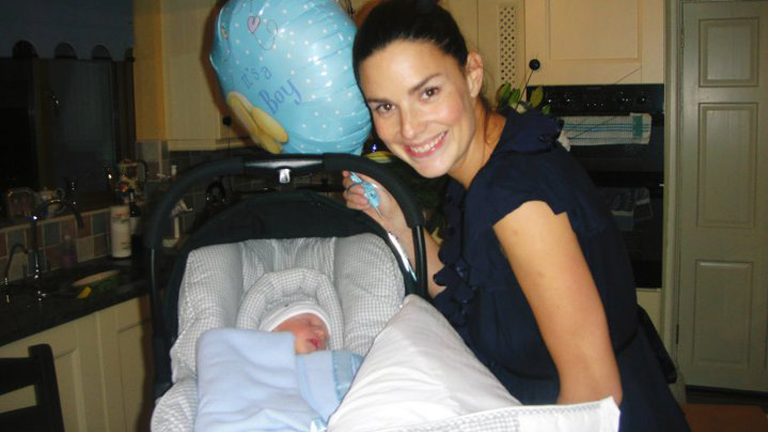Postnatal depression affects 1 in 10 women, and left single mother and former model Alison Canavan suicidal. Now a wellness coach and author of Minding Mum, she shares her story of recovery with her best tips for self-care as a new mother
‘I feel like a caged animal that can’t escape. It’s a mixture of anger, self-hatred and frustration’, wellness coach and former model Alison Canavan, 39 wrote in her diary six years ago. Her new beautiful baby, James, was four months old. ‘I feel like such a burden. I can only imagine how they talk. I can’t even support my own child. I wouldn’t mind being in an accident and I think about wanting to die’. The transition from a model working across New York and Paris, to living with her mother at home in Ireland, single and broke with the responsibility of a new-born, left Alison feeling incapable, a disappointment, alone – and suicidal. ‘Don’t leave me alone with the baby’, Canavan told her mother.
But Canavan today is the picture of health and her ‘baby’ James is now a gorgeous six year-old. She discovered the benefits of self-help therapy and mindfulness during her recovery and her new book, Minding Mum, advises new mothers on how to prepare for life after childbirth and the importance of self-care.
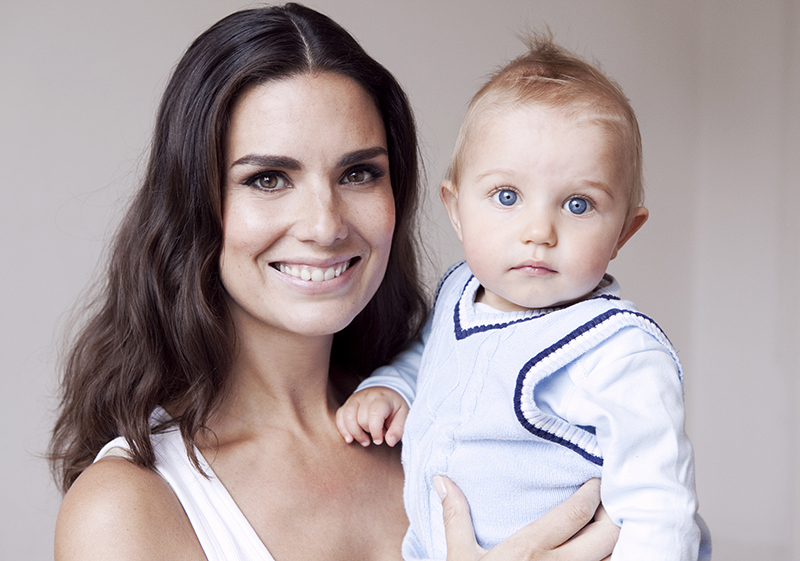
The symptoms of postnatal depression
‘Baby blues’ (feelings of anxiousness and sadness) are typical for a new mother in the first week, and are considered normal. But if these following symptoms persist, it could be postnatal depression or ‘postpartum’:
- a persistent feeling of sadness and low mood
- lack of enjoyment and loss of interest in the wider world
- lack of energy and feeling tired all the time
- trouble sleeping at night and feeling sleepy during the day
- difficulty bonding with your baby
- withdrawing from contact with other people
- problems concentrating and making decisions
- frightening thoughts – for example, about hurting your baby
You’re not alone
Developing gradually, many women don’t realise they have postnatal depression. Alison was unaware of what it was entirely, with no one mentioning the chances of it to her during her pregnancy six years ago. ‘Standing in the kitchen alone crying made me feel so isolated and lonely, despite always having another human being by my side’, Alison recalls. As Alison began to speak out regularly about her experience from her local celebrity platform, she soon discovered she wasn’t alone.
Celebrities such as Adele, Hayden Panettiere and Drew Barrymore have also shared their battles. Model Chrissy Teigen, 31, has been the latest star to open up. In an essay in Glamour in April, she relived her experience after the birth of her first daughter, Luna, with husband John Legend. She says; ‘Most days were spent on the exact same spot on the couch and rarely would I muster up the energy to make it upstairs for bed. John would sleep on the couch with me, sometimes four nights in a row. I started keeping robes and comfy clothes in the pantry so I wouldn’t have to go upstairs when John went to work. There was a lot of spontaneous crying.’
MORE: ‘Therapy on the NHS fixed my postnatal depression’
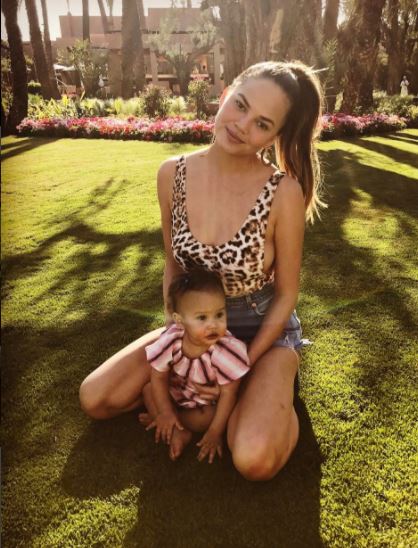
As Alison went through recovery, she embarked on a self-help journey, noticing she had been neglecting herself not only when her baby arrived, but her whole life. She shares her story with Healthista as well some of her best advice for overcoming crippling postnatal depression.
Alison’s story
‘My pregnancy was unexpected, and it wasn’t the most typical journey into motherhood, if there is one. I had been living in America modelling, and when my partner and I separated I moved back home to Ireland. I discovered I was expecting, and so decided to stay and have the baby.
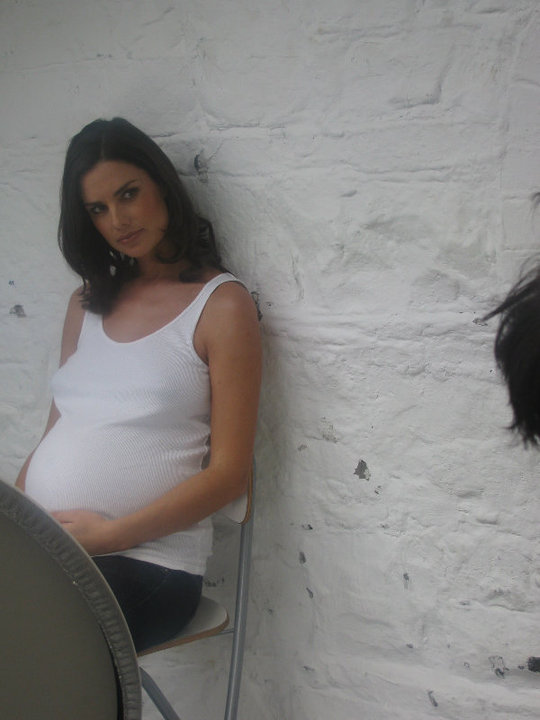
‘When I had James, I felt great initially and as though I had a lot of adrenaline. I think people were surprised at just how well I was doing, and they told me to slow down. But I was moving at 100 miles an hour, and did what every good mother does and decided to be superwoman. I discovered very soon that I wasn’t good at being superwoman.
This overwhelming sense of responsibility for his safety, wellbeing and health dawned on me.
‘It started with a feeling of pressure. I was a 32 year old single mother, and I felt judgement and as though I had something to prove. Previously a model, I wondered what was I going to do with my career now? I had someone else relying on me, too. One day, when James was asleep in his carrycot and there was no one else in the house, I decided to go to the shop and get milk. Then I gasped and realised I couldn’t even do that. I could never go anywhere ever again without this little person, and this overwhelming sense of responsibility for his safety, wellbeing and health dawned on me.
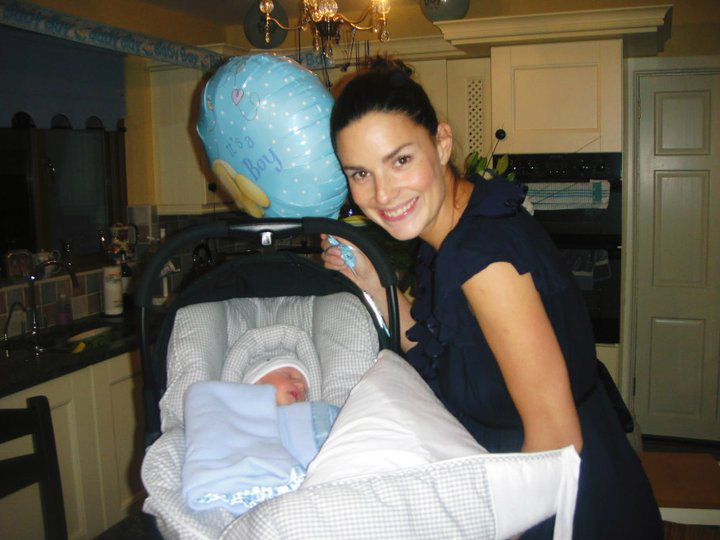
‘I kept pushing through, but after a couple of weeks I suddenly realised how tired I was. I became stressed and upset, beginning to cry a lot. I was told it was normal. In fact, the words ‘postnatal depression’, hadn’t ever been said to me during my pregnancy. I read the symptoms of postnatal depression and I was confused about whether I had it. The symptoms are so varied, with some mothers becoming obsessed with the baby. I just had an overwhelming sense of I couldn’t cope.
‘I remember looking at all my friends with babies and thinking, ‘why am I struggling so badly? Why does everyone else seem to be doing fantastically and just taking it in their stride? What is wrong with me?’. I was always so good with children and had always wanted them. I felt like this was my time to shine, but I became very disappointed with myself very quickly, thinking ‘Wow, I’m not even good at this’.
Changing a nappy would seem like a mountainous task
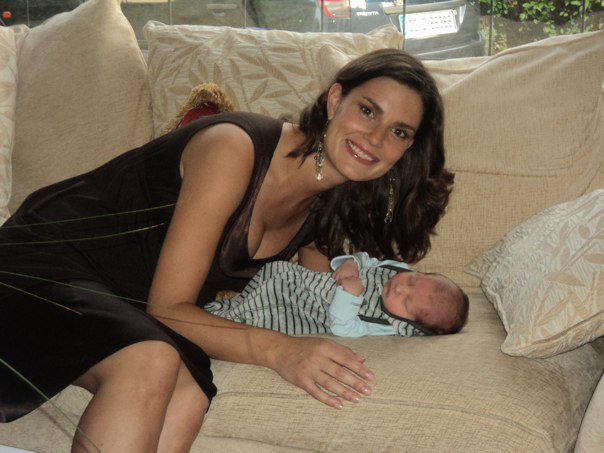
‘A few months into it, I was struggling with all of it. Simple everyday things became difficult. It got to the stage where every time I went to change James’ nappy I would cry because it seemed like a mountainous task. Walking through a shopping centre one day, I had a huge anxiety attack. My heart was pounding and my hands were sweaty, so I headed back to my car. A lady came up to me and asked if I needed help because I had been standing by my car for 10 minutes balling my eyes out because I couldn’t get the buggy down. I then had a fear of going out with the baby alone.
My inner critic came alive and it snowballed
‘I constantly asked myself, ‘am I doing this right? Is the baby sleeping enough? Is he sleeping too much?’ When I got into that conversation with myself, my inner critic came alive and it snowballed. I fed it, it grew, and I felt more and more like I wasn’t good enough.
MORE: Why depression is NOT all in your head
‘One day my mother and I drove into town, and I was sobbing. It’s difficult for people to be around that. I said to her, ‘Don’t leave me on my own with the baby because I don’t want to be here anymore’. My mum knew I was being serious, as I am a very resilient person who had made it through mental health problems in the past. She was scared, and I was scared. My sister phoned the hospital and said I urgently needed to be seen.
The first stages of recovery
‘A psychiatrist at the maternity hospital put me onto medication (anti-depressants). I was scared it would affect James because I was breastfeeding. I was sick of being told medication was the only way. Medication has its place for some people and it can definitely be a step on the ladder to recovery. But I wanted more for myself and knew there had to be more to it than taking pills. It was the catalyst for me to find other ways and I started on a journey of recovery.
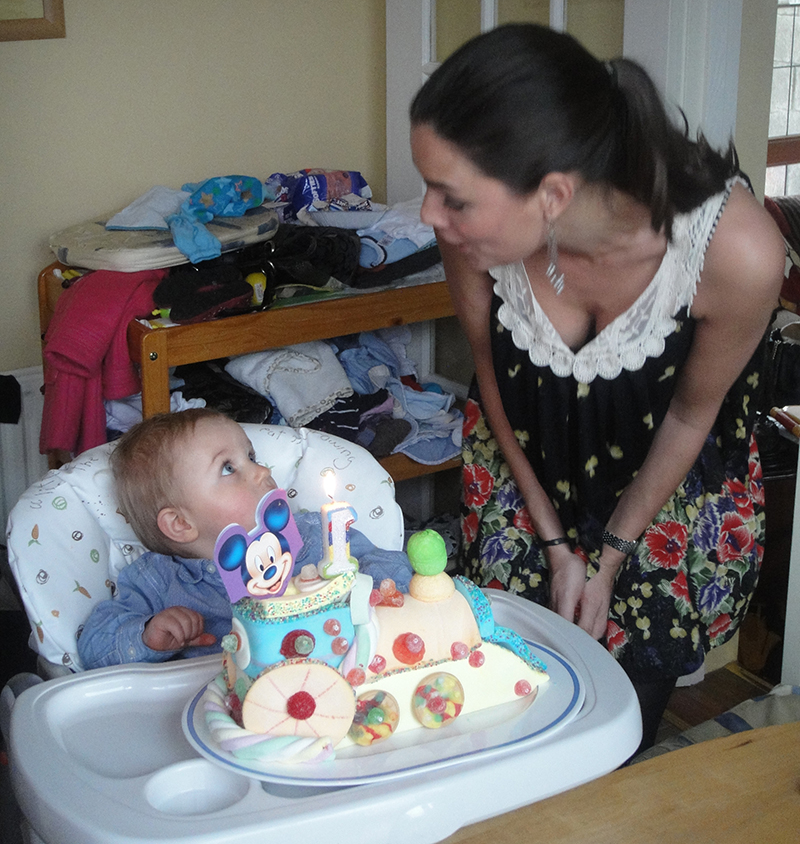
‘An awful lot of recovery is a blur for me and it was such a dark period of time. Standing in the kitchen alone crying made me feel so isolated and lonely. However, if I had known how many other mums out there were crying too, it would’ve helped. I spoke out about it from my local celebrity status as a model once in Ireland, and received so many emails from other women suffering. I sobbed whilst reading them, because they made me feel so normal again. Identifying with others was a huge part of my recovery. I had been suffering in silence until then, because I was in fear that authorities would take James away from me if they found out I wasn’t coping.
I just wanted to do three things a day; have a shower, have a walk, and change the nappies.
‘I was working with a lady called Madge from charity Postnatal Depression Ireland who had been through it 20 years earlier. She encouraged me to write down what I had done every day, no matter how small. I just wanted to do three things a day; have a shower, have a walk, and change the nappies. Those things, when you are unwell, are really big. I’ve continued to do that to this day as a gratitude diary, and it is one of the best habits to get into. I started eating better and exercising, and soon the fog began to lift.
‘I think we all need support in some form. Nobody can do this alone, we need each other and community. My relationship with my mum and sisters is amazing, and my cousin, Rita, was instrumental to my recovery. She lives an hour and a half away and drove up every day to help around the house. She never said anything to me, just did the laundry, chores, left and came back again like a silent angel. When you’re suffering from a mental health issue, the last thing you need is someone asking ‘do you want me to do this for you or that for you?’, because that reinforces that feeling of you feeling incapable of looking after your child.
MORE: How to help someone who is suicidal
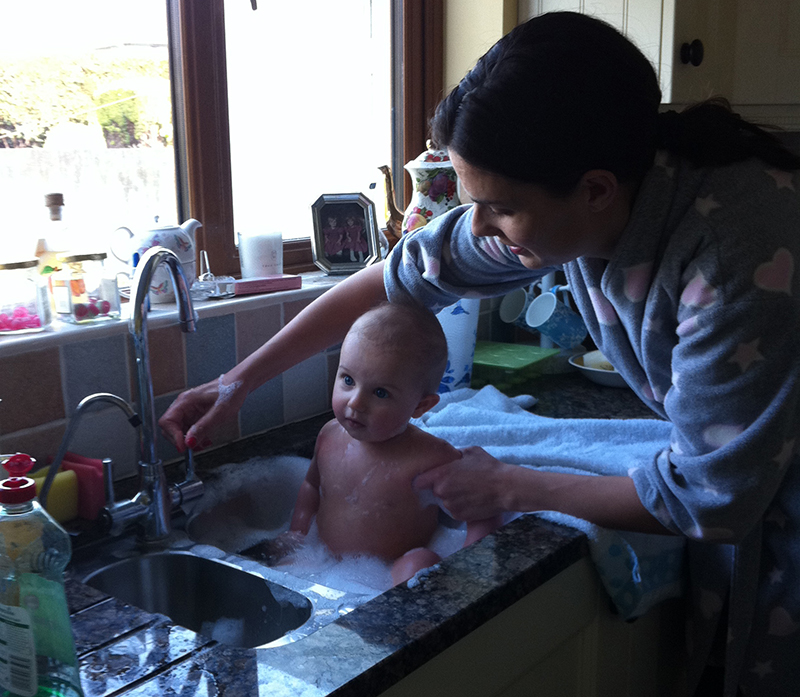
‘If you are struggling as a mother, join a local mum group, get therapy or pick up the phone and ring a helpline. It’s important to talk to someone and have that connection. I spoke to Madge from every night on the phone for weeks, and I will never forget the time she gave me. Going through it herself 20 years before, she told me everything would be okay. Just knowing someone has been through it and survived is incredibly heart-warming.
Self-care as a new mother
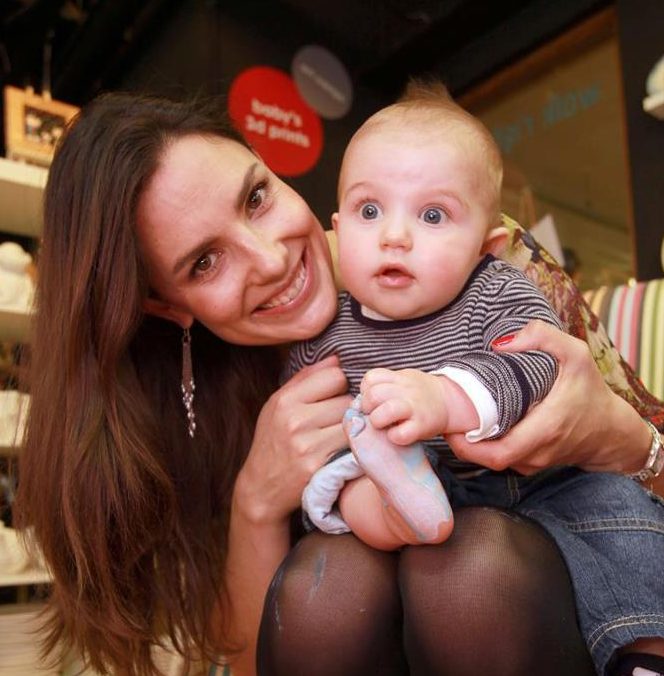
‘The more I felt better, the more I began to value myself. I’d never valued myself before, during all my years as a model. Initially it was all for James, because I wanted to be the best mum I could be. But during recovering this changed. I realised I needed to do it for myself first. I needed to put in the time and work so that I would feel good, and naturally I would be a good mother.
I always felt a void and had travelled the world trying to find happiness
‘One day I was sitting in my mother’s bedroom (I was living with her until James was 18 months), when I had an interesting experience. We are taught that happiness comes from external things, such as the job we have, where we live, what friends we have and our possessions. In my life, I was living the dream in those aspects, but I always felt a void. I had travelled the world trying to find happiness and couldn’t.
‘Whilst sitting on the bed, I took a deep breath in, and on the exhale, I felt a huge weight lifted off my shoulders. It was unusual, because I had nothing. I didn’t have my own home or car and was living off welfare and small bits of work. But when I was stripped bare, it finally dawned on me that we do have everything we need inside us. I had done meditation for years, but I never really understood it until this point.
MORE: 13 mindfulness exercises you can do right now
Finding peace
‘Ever since then I wanted to hold onto that feeling, and that was the motivation for the journey I have been on. I went back to college and studied nutrition coaching as well as mindfulness and meditation. This had led me to stand on a stage and talk about it in America with some of the biggest names in mindfulness.
https://www.instagram.com/p/BTWH9OVgPKh/?taken-by=alisoncanavanwellness
Alison speaking about mindfulness at an event.
‘I am now medication (and alcohol!) free. The real focus of my recovery was to value myself more. When you become a mother, it’s a big transition for anyone, I don’t care who you are. What we aren’t told when we become mothers is just how scary it is. Yes it’s the most amazing thing in the world and the biggest life satisfaction, but there is a huge period of adjustment for everybody and your life is switched upside down.
I don’t think mums are very honest
‘I don’t think mums are very honest. We are all in the same boat, and everybody is probably trying to look like they have it together. That’s life in every capacity, as we leave the house and put a mask on, pretending to cope when sometimes we aren’t. As a mother, there is a lot of societal pressure, and we can be hard on ourselves, too. Baby blues and postnatal depression wasn’t spoken about when I had James six years ago, but a lot has changed and the conversation is becoming louder.
MORE: 6 popstars opening up about their anxiety
Daily tips for recovering from postnatal depression
These are my personal tips for combating postnatal depression
- Rest: Try to get as much rest as possible. Sleep when the baby sleeps. This can be difficult if you have other children, so maybe ask someone to take care of them whilst you get kip.
- Walk: Try to have at least a 10-minute walk every day with the baby. This will stop you from feeling caged in, and fresh air does wonders for the brain.
- Small steps: This is key to moving forward. For example, take a shower. I know this can be hard when you’re tired, but it will do wonders for how you’re feeling.
- Keep a diary: Always write down how you feel and try to write down 10 positive things that happen each day no matter how small, even just ‘changed a nappy’ or ‘fed the baby’. When you start to see what you are doing, you will stop focusing on what you’re not doing. Journalling helped me recognise how hard I was on myself.
- Eat well: A good breakfast is essential. Cut out fried, fatty and sugary foods. Food and nutrients are the most powerful medication we have. Skipping meals is common with new mums, and this wreaks havoc with blood sugar, hormones, sleep and overall wellbeing.
- Befriend other new mums: Join a local mum and baby group so you can ask questions and learn from other mums and it’s also good to get out and about. Look online for listings in your area.
- Talk, talk, talk: Never suffer in silence. Tell someone if you’re not feeling well or go online and talk to other mums and ask questions. Call a helpline or speak to your family, spouse or friends. This will make you feel less alone, especially when you talk with others going through the same thing.
- Trust in yourself: ‘Mum knows best’, and know that you will return to the ‘real you’ soon.
- Talk to your GP: Find out what your options are in terms of medication and recovery, and, if necessary, find a good counsellor.
- Help others: As women, we need to support each other more and try to be a bit more open and honest. If you feel your friend needs help, try to talk to her gently about how she’s feeling. Also, encourage your partner to seek help if you think they might be having problems.
‘I find it difficult to think back to that dark period of my life, and read those diary entries, which I don’t even remember writing. From my own experience, I learned that you must own your feelings, acknowledge them and work through them. With the right support, you will recover, and quicker than you think. I took baby steps and lived day by day, which helped me to focus on the present and appreciate what I had, my beautiful son who has taught me so much.
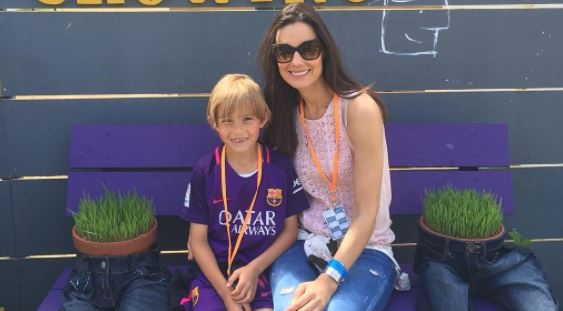
If you are concerned about your mental health, seek advice from websites such as MIND or PANDAS (pre and postnatal depression advice).

(£13.48 on Amazon), a health and wellness coach, NLP Practioner and motivational speaker.
Follow her on Twitter and Instagram.
READ MORE:
Best bits of mum wisdom from people on the streets of London
5 beliefs making your anxiety worse
7 breathing techniques for any emotional problem
Like this article? Sign up to our newsletter to get more articles like this delivered straight to your inbox.



